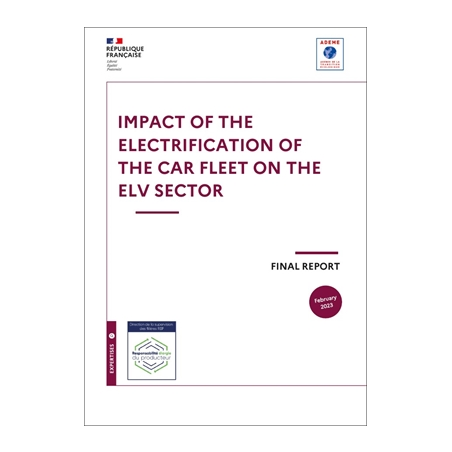Impact de l'électrification du parc de voitures sur la filière de traitement des VHU
Etude/Recherche
Mis en ligne le : 27/11/2023

The increasing electrification of the vehicle fleet will have consequences on the management of end-of-life vehicles (ELVs). Electrified ELVs requires specific equipment and staff training for the management and removal of electric batteries.
This study allowed to assess the level of preparation of the Authorized Treatment Facility for the gradual arrival of these ELVs. The study also established that in the short term (by 2025-2030) the volume of electrified ELVs will remain low, which will allow the ELV sector to prepare for the future. Due to the slow rate of vehicle renewal, the flows of internal combustion engine and electrified ELVs will not be equivalent until 2040.
The study also includes an analysis of the economic impact of vehicle electrification on the ELV sector. To adapt to the new steps of processing electrified ELVs, Authorized Treatment Facility will have to invest in staff training and the necessary equipment, representing a total investment cost of 20.5 million Euros over the period 2022-2040.
The increasing electrification of the vehicle fleet will have consequences on the management of end-of-life vehicles (ELVs). Electrified ELVs requires specific equipment and staff training for the management and removal of electric batteries.
This study allowed to assess the level of preparation of the Authorized Treatment Facility for the gradual arrival of these ELVs. The study also established that in the short term (by 2025-2030) the volume of electrified ELVs will remain low, which will allow the ELV sector to prepare for the future. Due to the slow rate of vehicle renewal, the flows of internal combustion engine and electrified ELVs will not be equivalent until 2040.
The study also includes an analysis of the economic impact of vehicle electrification on the ELV sector. To adapt to the new steps of processing electrified ELVs, Authorized Treatment Facility will have to invest in staff training and the necessary equipment, representing a total investment cost of 20.5 million Euros over the period 2022-2040.
Documents associés
Etude/Recherche
Mis en ligne le : 27/11/2023
Impact of the electrification of the car fleet on the ELV sector